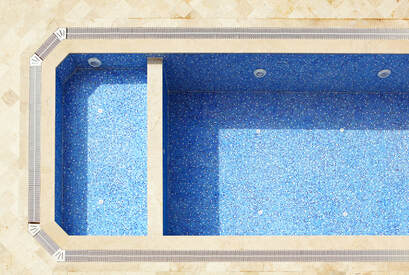 A backyard pool is a wonderful investment that adds value to your home and offers a new favorite spot for your family. It’s where you can relax, your children can play, and your friends and loved ones gather around during intimate gatherings. But to maintain its beauty, you need to keep it clean, particularly its tiles. Pool tiles come in different colors and designs that add personality to your pool. Although they beautify your favorite spot, they accumulate debris, grime, and stains over time. Unless you take the time to clean them, your pool could become so dirty that it’s no longer safe to swim in it. There are various types of residue that can accumulate on your tiles. Each of them requires unique cleaning methods, so determine first what’s on your tiles before cleaning them. To learn more about how to clean them properly, here are some common substances that can make your pool look dirty:
Oily scum deposits usually come from waste from creams, lotions, and other products applied before getting in the pool. Some are even shed from hair and skin. When left uncleaned for a long time, they can be challenging to get rid of. To remove such a hassle, invest in a top-performing acid-based tile cleaner and high-quality scrubber. To prevent oily scum, there are several ways you can improve your maintenance routine. You may use a pool clarifier and skimmer, add enzymes to the pool water weekly, and balance the water’s pH level.
The white spots you see on your pool tiles are likely calcium deposits. They appear from calcium silicate or calcium carbonate when the pool water evaporates. The flaky and rough ones can be removed with muriatic acid, but the oilier type can be extremely difficult to remove. Leaving these calcium deposits alone over time can damage your pool equipment and tiles. They can even irritate skin and eyes while swimming. To prevent these problems, take time to clean them up whenever you notice calcium starts to build up. You can do this by scheduling a reverse osmosis water treatment, installing a pool cover whenever the pool isn’t in use, and lowering the pool water pH level. If you opt to scrub calcium deposits away on your own, use a pumice stone stain eraser or scale remover. Use a vacuum to clean up the calcium flakes. Meanwhile, you also have the option to hire a professional pressure washing provider to eliminate these calcium deposits for you. They also have the tools and experience necessary to get the job done right, so you are assured your pool tiles will be sparkling clean in no time.
Stubborn stains can stay on your tiles and are challenging to get rid of. Traditional cleaning methods won't work against them, so it’s advisable to receive pressure washing services.With commercial-grade equipment, cleaning contractors can blast away those hard stains quickly. This is why it’s best to consider professional pool cleaning as part of your regular pool maintenance routine. Conclusion Your pool is a significant investment. Don’t let it go to waste by taking care of it properly. To get started, clean the pool tiles by following these tips. You may also need professional help to get rid of stubborn substances that can be too challenging for you to eliminate. For this reason, consider scheduling a power washing service appointment today. Relax and swim in crystal-clear water by seeking superior power washing by Kingwood All Star Window & Power Washing. We take pride in offering a fast response and providing you with getting the results you’re looking for. Contact us today to get a free quote!
1 Comment
9/6/2022 09:20:47 am
I want to make sure that my pool tile is properly maintained. It makes sense that cleaning it correctly would be important. That seems like a good way to ensure that I handle things right.
Reply
Leave a Reply. |
AuthorWrite something about yourself. No need to be fancy, just an overview. Archives
February 2022
Categories |
 RSS Feed
RSS Feed